Showing 1–12 of 80 results
1000 Full Moons is an anthology of 21 articles and poems, written by the students and admirers of Guru Muni Narayana Prasad like Swami Tyageswaran, Swami Tanmaya, Swami Vyasa Prasad, Scott Teitsworth, Deborah Buchanan, Andy Larkin and a few other bright minds/scholars, on the occasion of his 80th birthday. It has serious philosophical essays, fond reminisces and a few poems along with some interesting photographs marking important events in his life. The book’s philosophical reflection is a continuum of the vision and teachings of Narayana Guru, a highly venerated spiritual guru, philosopher, visionary and social reformer, and his immediate successors, Nataraja Guru and Guru Nitya Chaitanya Yati. Guru Muni Narayana Prasad, as the successor to Guru Nitya Chaitanya Yati, is an epitome of great wisdom, and is fully dedicated to Guruhood in general and to the life and teachings of Narayana Guru in particular.
This book, a work on human doing, analyses and applies three central aspects of human life – Action, Freedom and Responsibility – in the wide spectrum of the Philosophy of Mind. Reflections on these issues and their interconnections have a significant effect on the Philosophy of Value and application of ethical theories in practical life. This book even reconstructs the conceptual connection between action and freedom, on the one hand, and that between freedom and responsibility, on the other.
It also puts the concepts of freedom and determinism to critical test and reinterprets them from different angles and perspectives. The conventional doctrine of karma, based on the teachings of the Bhagavadgātā, is relieved from its usual deterministic presentation and a logically reasonable explanation is offered.
Human actions and human agency are central concepts in the philosophy of mind and action. Free will and responsibility constitute the bedrock of the moral life of the human agents and the book pinpoints that freedom is meant to undertake the goal-oriented actions. It is, therefore, focused on the enquiry into the various aspects of philosophy of mind, as well as the philosophy of value.
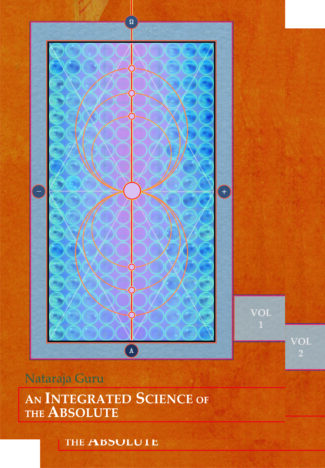
It is not just the magnum opus, but a truly monumental effort of a scientist-philosopher who has spent a whole lifetime to formulate a unitive science, wherein all disciplines of human questing could find a common ground a science where modern science and ancient spiritual wisdom could meet and merge like two opposite poles of a magnet. As a direct disciple of one of the great rishis of the modern age, Nataraja Guru discovers this common ground in Brahma-vidya?, which he calls the Integrated Science of the Absolute, and which has, at its base, his Gurus Dars?ana Ma?la?.
A string of hundred Sanskrit verses, composed by the mystic-poet, Narayana Guru (18541928), the Dars?ana Ma?la? is the very epitome of all visions of truth inspired by his remarkable acquisitions of Upanis?adic thought and, yet far more, by his own tapas (mystical discipline). Reproducing these highly significative verses in Roman script, along with English translations, word meanings, and extensive commentaries, Nataraja Guru not only spells out his mentors Visions of the Absolute in contemporary idiom, but also shows how these visions are fully validated by modern science.
Eclectic synthesis of varied scientific disciplines into a systematic whole is not all that Nataraja Guru accomplishes here. Rather, his book (now in third edition) is an attempt to reintroduce Brahma-vidya? as the one Master Science that embraces every branch of science, every human interest.
It is not just the magnum opus, but a truly monumental effort of a scientist-philosopher who has spent a whole lifetime to formulate a unitive science, wherein all disciplines of human questing could find a common ground a science where modern science and ancient spiritual wisdom could meet and merge like two opposite poles of a magnet. As a direct disciple of one of the great rishis of the modern age, Nataraja Guru discovers this common ground in Brahma-vidya, which he calls the Integrated Science of the Absolute, and which has, at its base, his Gurus Dars?ana Mala.
A string of hundred Sanskrit verses, composed by the mystic-poet, Narayana Guru (18541928), the Darsana Mala is the very epitome of all visions of truth inspired by his remarkable acquisitions of Upanisadic thought and, yet far more, by his own tapas (mystical discipline). Reproducing these highly significative verses in Roman script, along with English translations, word meanings, and extensive commentaries, Nataraja Guru not only spells out his mentors Visions of the Absolute in contemporary idiom, but also shows how these visions are fully validated by modern science.
Eclectic synthesis of varied scientific disciplines into a systematic whole is not all that Nataraja Guru accomplishes here. Rather, his book (now in third edition) is an attempt to reintroduce Brahma-vidya as the one Master Science that embraces every branch of science, every human interest.
It is well-known that the Jain tradition has been extremely influential in the development of Indian thought and culture. The Jain tradition teaches that there is an interdependence of perception, knowledge, and conduct unified by an axiomatic principle of non-violence in thought, speech, and action. In this way, non-violence defines the core of the Jain tradition, which has had a profound effect on other dharmic traditions originating in India. Jain Dharma is so significant that in some ways it may be incomplete to attempt to understand other Indian traditions (such as Buddhism or Hinduism) without knowing the basics of the Jain tradition, since these other traditions developed in an ongoing dialogue with the insights and wisdom of Jain respondents and visionaries.
This book enables the reader to enjoy a comprehensive journey into the intricate world of Jain thought and culture in a way that is philosophical in its compelling rationality, deeply spiritual in its revelations, yet accessible in its language. The organization of this book allows the reader to engage in an overview of the central teachings of the Jain tradition, but also to ascertain the profundity of its depths. It can be read with equal efficacy in succession from beginning to end, or pursued by individual topics of interest to the reader. Either strategy will have the same effect: a systematic understanding of what the timeless teachings of Jain thinkers have to say about the universal issues of the human condition – and how we might understand our harmonious relationship with other living entities as a powerful and effective spiritual journey.
Vedanta holds an unparalleled and unique place among the six systems of Indian philosophy. Though the Vedas are the fountainhead of Indian philosophical systems, Vedanta incorporates the philosophical thoughts resplendent in the Upanishads, the Brahmasutras, the Bhagavatgita, and in the commentaries on all these texts.
An Introduction to Vedanta introduces the Vedanta philosophy in brief and talks about its cardinal issues like self-control and the meaning of worship, maya and its gunas, upadhi, the theory of cycle, subtle bodies, the role of meditation, samadhi and its four major obstacles, Brahman realization and the state of a jivanmukta and his relation with Brahman and the world.
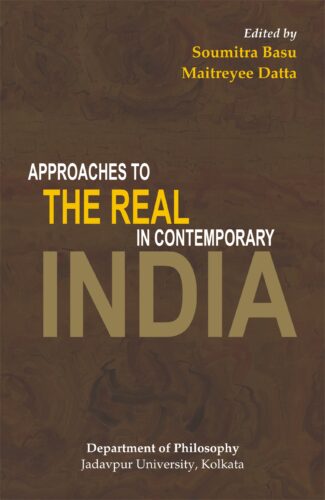
This volume focuses on those issues of the “Real” which have been treated and discussed by the philosophers of contemporary India such as K.C. Bhattacharyya, Surendranath Dasgupta, S. Radhakrishnan, Ras-Vihari Das, P.T. Raju, Satchidananda Murty and J.N. Mohanty.
“Man’s inquisitiveness to know about the “Real” has its origin in the philosophical traditions of the West and the East alike. For the ancient Greeks, the Real was metaphysical in nature and they sought to determine the nature of the real through the teachings of philosophers like Aristotle. These views later found place in the philosophy of many Christian fathers of the medieval period. With the Renaissance, the Western philosophy underwent an epistemic turn, so also discussions on the Real. In Indian philosophical heritage, the classical Indian philosophers of different philosophical systems too tried to grasp the concept of the Real from different theoretical frameworks and envisaged certain conclusions. The articles presented in this volume focus on those issues of the Real which have been treated and discussed by the philosophers of contemporary India such as K.C. Bhattacharyya, Surendranath Dasgupta, S. Radhakrishnan, Ras-Vihari Das, P.T. Raju, Satchidananda Murty and J.N. Mohanty. It also gives a glimpse on Professor Mohanty’s view on the Einstein–Tagore controversy.”
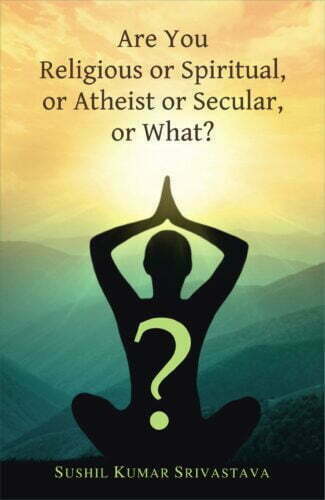
This book targets those persons who seek to learn about and understand the multiple forms of religious or spiritual or secular life, across the globe. It aims to foster mutual understanding, communication and dialogues between persons having different religious, spiritual and secular orientations.
The book, more than a philosophic endeavour, elaborately and meticulously discusses a vibrant thought – Are You Religious or Spiritual, or Atheist or Secular, or What? – for our deep contemplation and action, and suggests means to address the challenges that crop up in our spiritual life in a simple and lucid style. It is focuses on those persons who seek to learn about and understand the multiple forms of religious or spiritual or secular life. It aims to foster mutual understanding, communication and dialogues between persons having different religious, spiritual and secular orientations, and calls for a peaceful coexistence of people of different world views. In the present world spiritual scenario, it suggests a spiritual alternative of letting go with love and compassion, which is highly appealing. Also it gives an overview of the major religion of the world, keeping in mind both religious and non-religious people and persons from all walks of life. The unique feature of this volume is its down to earth practicality and simplicity in introducing, analysing and guiding its readers when dealt with a complex topic of religion and spirituality.

This beginner-friendly book offers a clear and concise introduction to Indian philosophy, covering key concepts, major schools of thought, and progressive ideas like Vedic feminism and environmental awareness. Ideal for curious minds, it encourages deeper exploration.
“This introductory book on Indian philosophy is thoughtfully crafted for beginners and inquisitive readers interested in exploring the core concepts and varied traditions of this rich intellectual heritage. It is not aimed at advanced scholars or regular students, but at sincere seekers ready to embark on their initial journey into the subject. Presented with clarity and ease, it offers a solid foundation and encourages further engagement with original texts and academic perspectives.
Covering ten essential topics, the book touches upon the common characteristics of Indian philosophy, environmental awareness as reflected in the Vedas, and Vedic feminism – highlighting the progressive and inclusive elements of early Indian thought. It also introduces readers to key texts like the Upaniṣads and explores major philosophical schools, including Cārvāka (materialism), Bauddha (Buddhist), and Jaina philosophies, as well as the Nyāya–Vaiśeṣika, Sāṁkhya–Yoga, and Mīmāṁsā–Vedānta systems.
Each chapter offers a brief yet insightful overview, making complex philosophical ideas approachable for new learners. The inclusion of an epilogue adds further value by guiding readers toward additional resources for advanced study, expanding their understanding beyond the scope of the book.
This book is ideal for anyone interested in the spiritual, ethical, and metaphysical inquiries that have shaped Indian tradition. With its concise explanations and thoughtful structure, it is a valuable companion on the journey into Indian philosophical thought.”
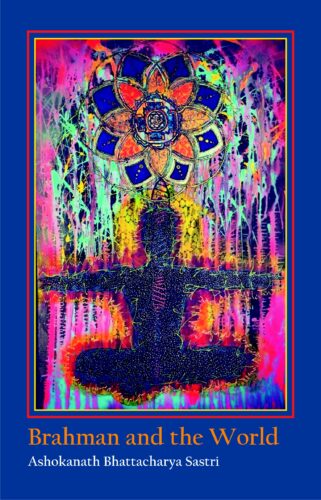
The Ved?nta has been rightly called the Finest Fruit of Indian Thought and the Upani?ads as the Finer Flowers. Ved?nta grows out of the teachings of the Upani?ads and passes into the various systems in the writings of ?a?kara, Bh?skara, R?m?nuja, Madhva and Vallabha, the great founders of Advaita, Bhed?bheda, Vi?i???dvaita, Dvait?dvaita and ?uddh?dvaita, respectively. However, there is a perception among Orientalists that while the Upani?ads favour the Monistic doctrine, B?dar?ya?as Brahmas?tra fundamentally opposes it on some of the most crucial points.
The book thus delves deep into the philosophies of both B?dar?ya?a and ?a?kara in enunciating the essential features of Brahman and Its association with the world. It thus discusses topics such as what sort of cause Brahman is?, and what sort of material causality is to be ascribed to It? It also addresses the conflicting views on the nature of Brahman like that of Vivarttav?da and of R?m?nujas Sagu?a-Brahman.
This book proposes to take up the question of Universal Causation to examine thoroughly as how far it is right to regard Brahman as the Universal Cause and how far s?trak?ra himself lent his support to each of the inter-conflicting schools of Ved?nta. This book should, therefore, benefit all who are devoted to the philosophic teachings of Advaita Ved?nta and its preceptors.
“The Vedānta has been rightly called the Finest Fruit of Indian Thought and the Upaniṣads as the Finer Flowers. Vedānta grows out of the teachings of the Upaniṣads and passes into the various systems in the writings of Śaṅkara, Bhāskara, Rāmānuja, Madhva and Vallabha, the great founders of Advaita, Bhedābheda, Viśiṣṭādvaita, Dvaitādvaita and Śuddhādvaita, respectively. However, there is a perception among Orientalists that while the Upaniṣads favour the Monistic doctrine, Bādarāyaṇa’s Brahmasūtra fundamentally opposes it on some of the most crucial points.
The book thus delves deep into the philosophies of both Bādarāyaṇa and Śaṅkara in enunciating the essential features of Brahman and Its association with the world. It thus discusses topics such as what sort of cause Brahman is?, and what sort of material causality is to be ascribed to It? It also addresses the conflicting views on the nature of Brahman like that of Vivarttavāda and of Rāmānuja’s Saguṇa-Brahman.
This book proposes to take up the question of Universal Causation to examine thoroughly as how far it is right to regard Brahman as the Universal Cause and how far sūtrakāra himself lent his support to each of the inter-conflicting schools of Vedānta. This book should, therefore, benefit all who are devoted to the philosophic teachings of Advaita Vedānta and its preceptors.”
Chinese philosophy is highly unique in its profound sense of moral thinking. The fundamental thesis of Chinese thinking is interdependence and mutual relationships between entities, human and natural. For great thinkers like Confucius and Lao zi a human being is a relatively constituted and situated self. What is important in social living is correlative thinking and resonance, complementary approach to differences, action guiding nature of judgment and the effective appropriation of naturalness and spontaneity in the interrelations between individuals, human beings and nature. The book is a prelude to study the significance of personal excellence and social harmony embedded in Chinese philosophical tradition.
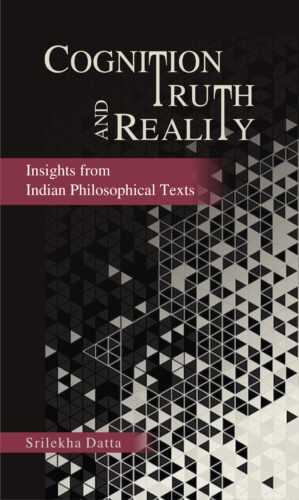
The book addresses various fundamental topics of philosophy in the area of epistemology and metaphysics like doubt, memory, perception, truth and validity, the self, consciousness and universals; and these are explored from the perspective of Indian philosophy.
“This book contains a number of essays on various fundamental topics of philosophy in the area of epistemology and metaphysics. Topics like doubt, memory, perception, truth and validity, the self, consciousness and universals are explored from the perspective of Indian philosophy. The discussion here is based on Indian philosophical texts which bear the evidence of analytical mind of the Indian thinkers and their critical approach to the subject. The author has suggested some new interpretation in some cases and offered some alternative solution to certain problems. These essays are the results of the author’s intensive study of the subject. This book will be useful for students and researchers. A survey of the opinions of different schools of philosophy on different topics can be found here and the scope for further research on those areas has also been shown.”
The aim of this book is to achieve a proper theoretical understanding of democracy through philosophical explorations. By these explorations we want to reach some unitary decision on at least three things. The first one involves the concept of democracy. The next one is concerned with the purpose of democracy. The final one is concerned with what is necessary for ensuring and developing democracy in a state or society in the absence of which democracy gets threatened. We will explore and analyze the interconnections between these three dynamics.
| There are no products |